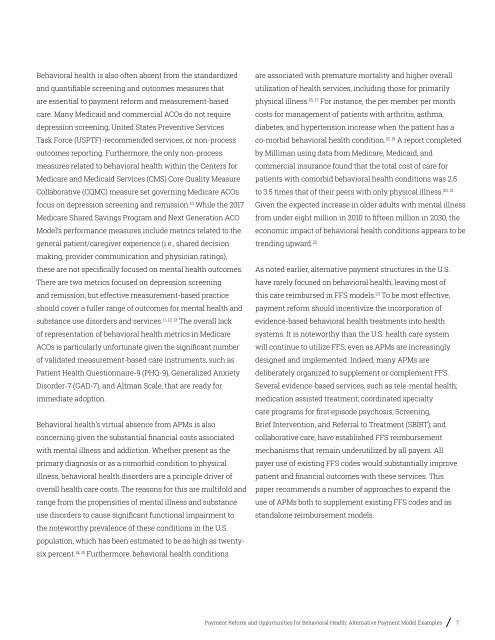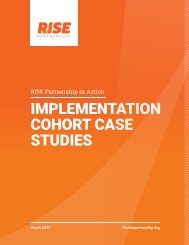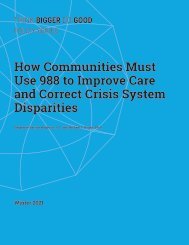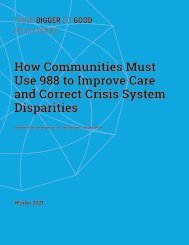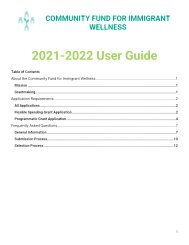Alternative Payment Models
You also want an ePaper? Increase the reach of your titles
YUMPU automatically turns print PDFs into web optimized ePapers that Google loves.
Behavioral health is also often absent from the standardized<br />
and quantifiable screening and outcomes measures that<br />
are essential to payment reform and measurement-based<br />
care. Many Medicaid and commercial ACOs do not require<br />
depression screening, United States Preventive Services<br />
Task Force (USPTF)-recommended services, or non-process<br />
outcomes reporting. Furthermore, the only non-process<br />
measures related to behavioral health within the Centers for<br />
Medicare and Medicaid Services (CMS) Core Quality Measure<br />
Collaborative (CQMC) measure set governing Medicare ACOs<br />
focus on depression screening and remission. 10 While the 2017<br />
Medicare Shared Savings Program and Next Generation ACO<br />
Model’s performance measures include metrics related to the<br />
general patient/caregiver experience (i.e., shared decision<br />
making, provider communication and physician ratings),<br />
these are not specifically focused on mental health outcomes.<br />
There are two metrics focused on depression screening<br />
and remission, but effective measurement-based practice<br />
should cover a fuller range of outcomes for mental health and<br />
substance use disorders and services. 11, 12, 13 The overall lack<br />
of representation of behavioral health metrics in Medicare<br />
ACOs is particularly unfortunate given the significant number<br />
of validated measurement-based care instruments, such as<br />
Patient Health Questionnaire-9 (PHQ-9), Generalized Anxiety<br />
Disorder-7 (GAD-7), and Altman Scale, that are ready for<br />
immediate adoption.<br />
Behavioral health’s virtual absence from APMs is also<br />
concerning given the substantial financial costs associated<br />
with mental illness and addiction. Whether present as the<br />
primary diagnosis or as a comorbid condition to physical<br />
illness, behavioral health disorders are a principle driver of<br />
overall health care costs. The reasons for this are multifold and<br />
range from the propensities of mental illness and substance<br />
use disorders to cause significant functional impairment to<br />
the noteworthy prevalence of these conditions in the U.S.<br />
population, which has been estimated to be as high as twentysix<br />
percent. 14, 15 Furthermore, behavioral health conditions<br />
are associated with premature mortality and higher overall<br />
utilization of health services, including those for primarily<br />
physical illness. 16, 17 For instance, the per member per month<br />
costs for management of patients with arthritis, asthma,<br />
diabetes, and hypertension increase when the patient has a<br />
co-morbid behavioral health condition. 18, 19 A report completed<br />
by Milliman using data from Medicare, Medicaid, and<br />
commercial insurance found that the total cost of care for<br />
patients with comorbid behavioral health conditions was 2.5<br />
20, 21<br />
to 3.5 times that of their peers with only physical illness.<br />
Given the expected increase in older adults with mental illness<br />
from under eight million in 2010 to fifteen million in 2030, the<br />
economic impact of behavioral health conditions appears to be<br />
trending upward. 22<br />
As noted earlier, alternative payment structures in the U.S.<br />
have rarely focused on behavioral health, leaving most of<br />
this care reimbursed in FFS models. 23 To be most effective,<br />
payment reform should incentivize the incorporation of<br />
evidence-based behavioral health treatments into health<br />
systems. It is noteworthy than the U.S. health care system<br />
will continue to utilize FFS, even as APMs are increasingly<br />
designed and implemented. Indeed, many APMs are<br />
deliberately organized to supplement or complement FFS.<br />
Several evidence-based services, such as tele-mental health;<br />
medication assisted treatment; coordinated specialty<br />
care programs for first episode psychosis; Screening,<br />
Brief Intervention, and Referral to Treatment (SBIRT); and<br />
collaborative care, have established FFS reimbursement<br />
mechanisms that remain underutilized by all payers. All<br />
payer use of existing FFS codes would substantially improve<br />
patient and financial outcomes with these services. This<br />
paper recommends a number of approaches to expand the<br />
use of APMs both to supplement existing FFS codes and as<br />
standalone reimbursement models.<br />
<strong>Payment</strong> Reform and Opportunities for Behavioral Health: <strong>Alternative</strong> <strong>Payment</strong> Model Examples 7


